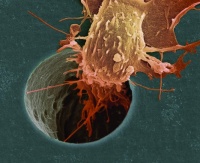
The technology has been developed by scientists at Barts and The London School of Medicine and Dentistry at Queen Mary University of London, and is being sold through their spin-out company Activiomics, which has agreed to deploy the innovation commercially with GlaxoSmithKline (GSK).
Mark Warne, interim chief executive of Activiomics, said that the technology, known as TIQUAS (Targeted Quantification of Cell Signalling), works by using a protease enzyme to break down a cell or tissue extract into peptide fragments. It then uses mass spectrometry and proprietary software to quantify thousands of peptides, known as phosphopeptides, in a way that is said to be more efficient than anything else on the market.
Warne said that analysing and interpreting cell signalling pathways is important for pharmaceutical companies in determining the effectiveness of a drug.
Pharmaceutical drugs are designed to block a certain protein target, he said. By analysing and interpreting cell signalling pathways, drug developers can see how well their drug blocks the target and the movement of other proteins in the network.
Warne said that one of TIQUAS’s main benefits over most current technologies is that it generates quantitative rather than qualitative data, an approach thought to provide higher throughput and more insight into the protein network.
Warne said another drawback of other current techniques is that they require labels such as antibodies. ’You can’t necessarily generate an antibody against every type of protein target,’ he said.
Warne admitted that, at this stage, the technology has only been proved with a limited number of protein targets. ’Our work will help validate commercially the broader applicability of the system too,’ he said.
TIQUAS was developed by Activiomics’ scientific founders Dr Pedro Cutillas and Prof Bart Vanhaesebroeck from Queen Mary’s Centre for Cell Signalling at the Institute of Cancer.
The agreement was announced through GSK’s Respiratory Centre of Excellence for Drug Discovery.










Water Sector Talent Exodus Could Cripple The Sector
Maybe if things are essential for the running of a country and we want to pay a fair price we should be running these utilities on a not for profit...